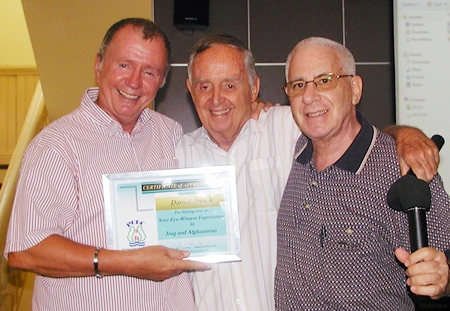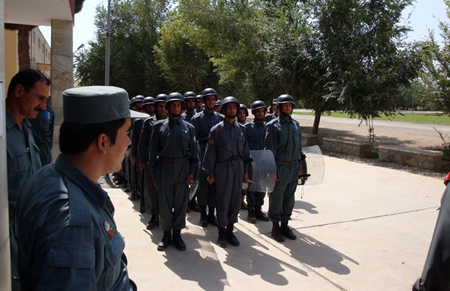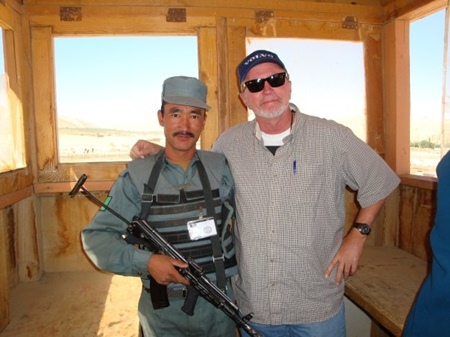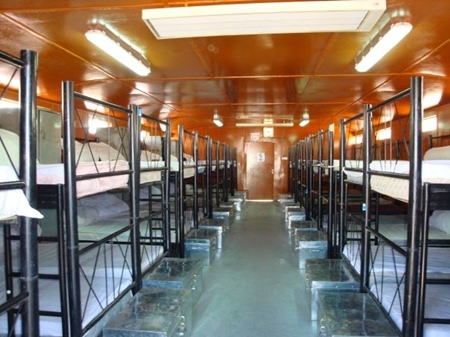Have you heard of disposable suits? Club member Darrell Brown had a story about that along with several other interesting comments about his service with the US State Department in both Iraq and Afghanistan when he spoke to the Pattaya City Expats Club on Sunday, April 7. Darrell, who is an American, joined the Foreign Service in 2002, after a stint in the navy and as a US Bank Examiner. He is retired now and emphasized that he was not speaking as a government representative, but was relating his personal experiences and observations.
Darrell said that while he was in the navy and later as a US Navy reservist, he spent some time on submarines. Darrell said that the process of choosing crews for submarines is “highly selective.” To work on a submarine, he said, “You have take an IQ test and fail it.” (He added that he was just joking.)
 Darrell Brown on left, with Gary Hacker and MC Richard Silverberg, following Darrell’s excellent talk. Darrell illustrated his talk with many photographs, some of which follow.
Darrell Brown on left, with Gary Hacker and MC Richard Silverberg, following Darrell’s excellent talk. Darrell illustrated his talk with many photographs, some of which follow.
In the Foreign Service, Darrell was posted first to Bogotá, Colombia (he had learned Spanish) and then to Baghdad (in 2004). Darrell gave some background on the ancient history of the Iraq area which goes back 5 thousand years and that it was the first known civilization. He explained how the country Iraq was created in 1919 when England, France, and others divided up the old Ottoman Empire. Inside the new borders were a number of ethnic groups that had been known not to get along very well. Darrell commented that thus, “The seeds of future conflict were sown.” Darrell explained that today Iraq is still very much a tribal culture. There are 15,000 tribes, some more powerful than others, some quite tiny. Most people’s first allegiance is to their tribe, not their country. This, he said, creates a shifting mosaic of allegiances and betrayals.
 Early Afghan ‘condos’.
Early Afghan ‘condos’.
Darrell noted that his first post in Iraq was in Baghdad, then the most dangerous place in Iraq. He served as Finance Officer at the US Embassy. On his next posting to Iraq, he went to Karbala and Najaf to work on a provincial reconstruction team. These were joint military and civilian teams. His job was in bank reconstruction. Working on a provincial reconstruction team was, and still is, dangerous, Darrell said. The day before Darrell spoke to the club, a woman Foreign Service Officer working on one of these teams was killed by a suicide bomber. Darrell explained that most casualties in Iraq at this time came from bombs. He showed a picture of his usual means of transportation; a specialized Humvee that had a device protruding from the front that was supposed to block cell phone signals from setting off road bombs.
 Kabul Police Academy.
Kabul Police Academy.
Darrell recounted several of his experiences including how special 14 foot high one foot thick walls around his quarters along with an armored roof saved his and others lives during a heavy mortar attack. He also mentioned how he met a lot of interesting people. One was the governor of the province of Najaf, a very intelligent and well educated man. This Iraqi was a rich man three times over. The first two times, Saddam Hussein took his fortune away. After the second time, the Iraqi fled to Norway. He returned after Hussein had been deposed; that’s when he made this third fortune. Another was an Iraqi exile who ran a clothing manufacturing operation in Italy. He had returned to help in the reconstruction operation by setting up a similar operation which made a lot of suits. Darrell said that Iraqis expected diplomats to wear suits, but they didn’t last long in the conditions they were in; thus the disposable suit idea. He would buy a dozen $10 suits from the new factory, wearing one for a bit and then disposing of it.
 Guard tower in Bamyan.
Guard tower in Bamyan.
After Baghdad, Darrell spent a year in Washington at the Bureau of International Narcotics and Law Enforcement Affairs (INL) in the State Department. Then it was off to Afghanistan where he worked on a variety of tasks, including helping to train Afghan police. He said that he had 2,500 subordinates working in 22 camps and that they trained about 22,000 police a year. It was an uphill struggle he explained because the recruits were mostly illiterate and there was widespread illicit drug use.
He described how they also created a special police training unit for women and the difficulties women faced in a male dominated culture, including many of the abuses they were subjected to. For example, a woman who is outdoors by herself is considered a prostitute and is treated like one. He said that women were abused not only by men, but also by other women “to keep them in line.” He said that he believes that these other women were themselves victims of abuse. “The cycle repeats itself,” he said. So, his people saw their job as trying to interrupt this “vicious cycle.” But this is very hard to do. “We tried to help just one woman at a time,” Darrell said. “It was the only way we knew how to handle it.”
 Kabul Police Academy dorm room.
Kabul Police Academy dorm room.
Darrell Brown was born in England in 1953 and graduated from Texas Tech with a Bachelor of Business Administration degree in Petroleum Land Management. He has lived in Thailand for four and a half years. He is on the Board of Directors of the Navy League of the United States, Siam Chapter, where he serves as Treasurer and Secretary to the Board.
Master of Ceremonies Richard Silverberg provided an update on upcoming events and called on Roy Albiston to conduct the Open Forum where questions are asked and answered about Expat living in Thailand; Pattaya in particular.
For more information about the many activities of the Pattaya City Expats Club, visit their website at www. pattayacityexpatsclub.com.




